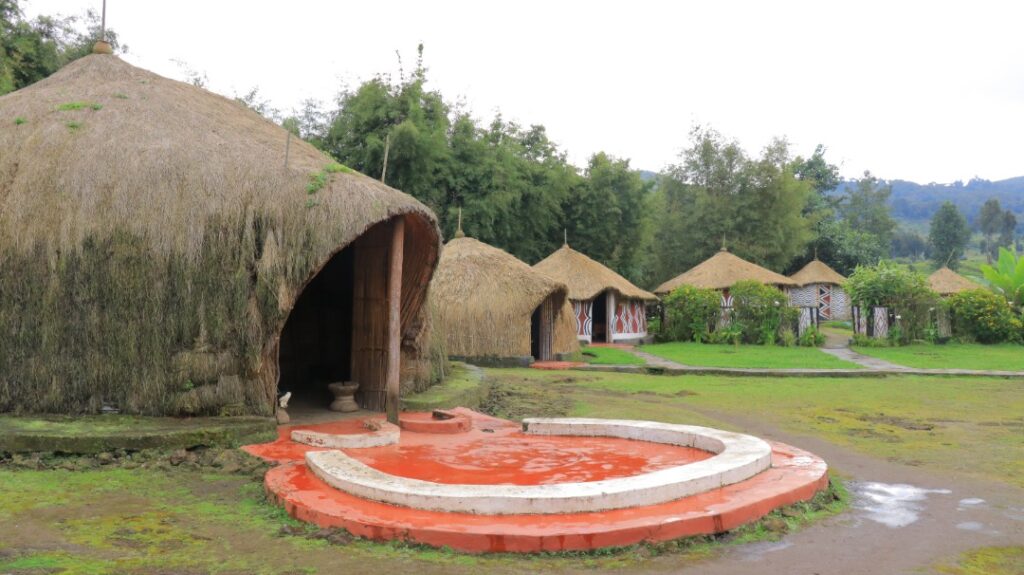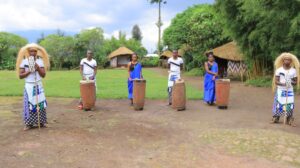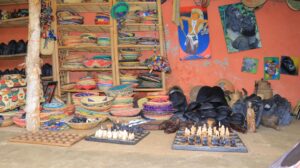From Poachers to Conservationist: How a Cultural Village Saved the Volcano National Park

Illustration of King Palace at Iby'Iwacu Village. The first on this line is the king's house, followed by shelters of his wives and subjects. In the context of Iby'Iwacu Village, these all these houses serve as guest houses for tourists. Image by H.Saïd Kelly
Until the early 2000s, poaching was a conspicuous part of the legacy of members of communities neighbouring Rwanda’s four national parks, such François Ndungutse from Kinigi sector, Nyabigoma cell, Nyakagezi village of Musanze district.
At the age of 15, three years before he had legally become an adult, Ndungutse started poaching animals in the nearby Volcano National Park.
“Poaching is the activity of our ancestors. At a tender age, we would start by accompanying our father to learn from him. We were always excited to carry the carcass of the animal from the poaching expedition, which would encourage us to be standalone poachers since our teenage years,” he confessed during a June 14th, 2022 interview.

Through decades, poachers continued with their activities that were hostile to the park’s population until Edwin Sabuhoro, a researcher conducted a study on the living condition of communities adjacent to the park in 2005.
“I found out that the cost of living adjacent to the park was higher than the benefits,” he said.
According to Sabuhoro, not only were the locals losing sources of their livelihoods to the human-wildlife conflict resulting from animal raids into their gardens, they were also not reaping the benefits of the tourism industry flourishing around them.
Consequently, Sabuhoro hatched the idea of starting Iby’Iwacu Cultural Village to improve the livelihoods of communities around the park through community-based enterprise development.
“The enterprises would act as an incentive for conservation,” he said.
Today, Iby’iwacu Cultural Village brings together 10 cooperatives, which consist of up to 2,400 members. It’s like a centre with Rwandan traditional houses which basically exhibit the Rwandan culture in its entirety.
Tourists can camp at the centre to be treated to traditional dance in the evenings, including drums and Intore (a cultural dance).

Similarly, this village gives guests a treatment of a king. Image by H. Saïd Kelly
They also give the tourists an introduction to traditional medicine and propose to sell to them gifts from arts and crafts boutiques.
Blacksmithing, milk preparation and traditional cuisine also find their place at Iby’Iwacu Cultural village.
Giving up on poaching, not an easy task
After starting Iby’Iwacu Cultural Village, the founder, Sabuhoro, handed it over to the neighboring communities to manage and utilize the facility.
Rwubahiriza is a member of Iby’Iwacu Cultural Village since day one. He says he knew he could get a better deal from the initiative compared to poaching. And he has not been disappointed so far.
“They trained us, taught us how to make handcrafts, including carving gorillas from wood. Most importantly, we make strong walking sticks for the tourists. They are an important component in gorilla trekking or mountain climbing in general,” said Jean Damascene Rwubahiriza, another poacher who was also integrated in Iby’iwacu village.
During a May 14th, 2022 interview, he added that you cannot do without the walking sticks while traversing Rwanda’s steep hills.
The art and crafts skills that Rwubahiriza learnt have now become a key source of his daily bread and school fees for his three children, two of whom are in secondary school. The third is in primary school.
“On top of that, I managed to build two houses in my neighbourhood and I now own two hectares of farmland from where I earn some 290USD (Rwf 300,000) every month,” he said, adding, “My future is bright.”

For Ndungutse, he is member of a farming cooperative from Iby’Iwacu Cultural Village “KAIKI’ which deals with the production of potato seeds. Since the day he joined, he can provide more nutritious food to his family of 8 kids, as well as more decent accommodation.
“Now I own 2 houses, one for my family and another for business whereas before when I was a poacher I used to sleep in a house without doors,” he recalls.
In addition, the potato seeds systems paid off for him, leading an increase in his farm output.
“I now have like two hectares of farmland and I can rent another plot of land to increase the yield from where I can earn 3,500 USD (3.5M rwf) in 4 months from potato,” he said with enthusiasm.
Ndungutse’s wife Mukamusoni said that life has changed.
“We no longer rely on the park for food. Our family of eight children is also fine because we cannot fail to raise the cost of medication in the community health insurance scheme-mutuelle de santé,” she stated.
According to Sabuhoro, the founder of Iby’Iwacu Cultural Village, getting Rwubahiriza and colleagues on board the initiative was not an easy task, but his approach involved so much listening.
“It was very important to listen and learn about their concerns, challenges, and needs. That’s how we started this community-based tourism enterprise through which communities can see and get tangible social-economic benefits that can help them improve their food, education, health, and financial securities,” Sabuhoro said.
Sabuhoro understood that charging fines, erecting fences around national parks, and taking poachers to jail, among other punishments, was not the best way of addressing the poaching challenges in the national parks.
“National parks and protected areas such as the volcanoes cannot thrive and survive without local communities’ involvement, access to tourism benefits, and improvement of their household livelihoods, food security, education, health, and finances,” he argued.
For Sabuhoro, conservation should be done for – and by – the local communities who should be the primary beneficiaries of the proceeds from parks and protected areas.
This implies that local communities should have a stake in the management of parks as major stakeholders.
Tourism revenue sharing, an added support
Sabuhoro’s efforts contribute to a national programme that intends to give communities in the vicinity of the parks what they need most, so that they do not find poaching an option.
These communities get a share of the national earnings in wildlife tourism annually.
As described in Rwanda’s Tourism Revenue Sharing policy and guidelines, which were revised in January 2020, tourism revenue sharing was put in place to support local communities around national parks to uplift their livelihoods and enhance their awareness on park conservation.
Beneficiaries are local communities in administrative sectors bordering national parks in the 14 Districts where these Parks are found.
Every year, this financial support is shared according to community project proposals submitted and the prevailing issues around the national parks. The key projects selection criteria include the expected impact on community livelihoods and the impact on park conservation.
The government also encourages other investors to dedicate a share of their earnings to the community in terms of corporate social responsibility.
In this context, at the launch of the Sabyinyo Silverback Lodge 14 years ago, according to former Northern Province Governor Jean Marie Vianney Gatabazi, “President Paul Kagame requested that every touristic facility coming up in Musanze district should make corporate social responsibility a priority and improve the lives of surrounding communities instead of evicting them.”
In that context, the surrounding communities formed SACOLA or ‘Sabyinyo Community Livelihood Association as part of a conservation drive to save mountain gorillas and other animals from encroachment.
Under SACOLA, part of the revenue generated by Sabyinyo siverback lodge has been deployed to different community activities across the district.
According to hotel managers, revenue streams totaling $3.3 million (Rwf2.9 billion) from the lodge have been deployed to self-managed socio-economic development projects undertaken by SACOLA.
The projects, says SACOLA Chairman Pierre Celestin Nsengiyumva, have directly benefited over 60,000 households in the sectors of Kinigi and Nyange which surround the Volcano National Park.
According to Nsengiyumva, the projects include construction of 52 classrooms of primary schools in Kinigi and Nyange
They also equipped technical schools in the area with computers worth Rwf1.5 billion to mention but a few.
Two local credit and saving cooperatives have also been established to benefit the neighboring communities, Nsengiyumva said.
Ngoga Telesphore, a conservation analyst at Rwanda Development Board (RDB), said that revenue going to the community since 2005 was 5% of the total tourism revenues collected from national parks. “This share has been raised from 5% to 10% in 2017”.
Impact to the community around Nationals Park
According to Ngoga, the tourism revenue sharing programme has led to visible changes, starting with the livelihoods of beneficiaries.
He said there is a record of 156 school projects that were constructed. There are also rainwater harvesting tanks, health facilities now in operation through 33 health centers constructed.
The mechanism also supported small and medium enterprises, like a cooperative of beekeepers in Musanze district, Northern Province.
Today, as a result of the income generating conservation projects and revenue-sharing initiatives, former-poachers-turned-friends-of-the-parks-and-their-habitat “have become informants who never tolerate any attempt to harm the park or any of its inhabitants.”
“This story was produced with the support of Internews’ Earth Journalism Network.”

